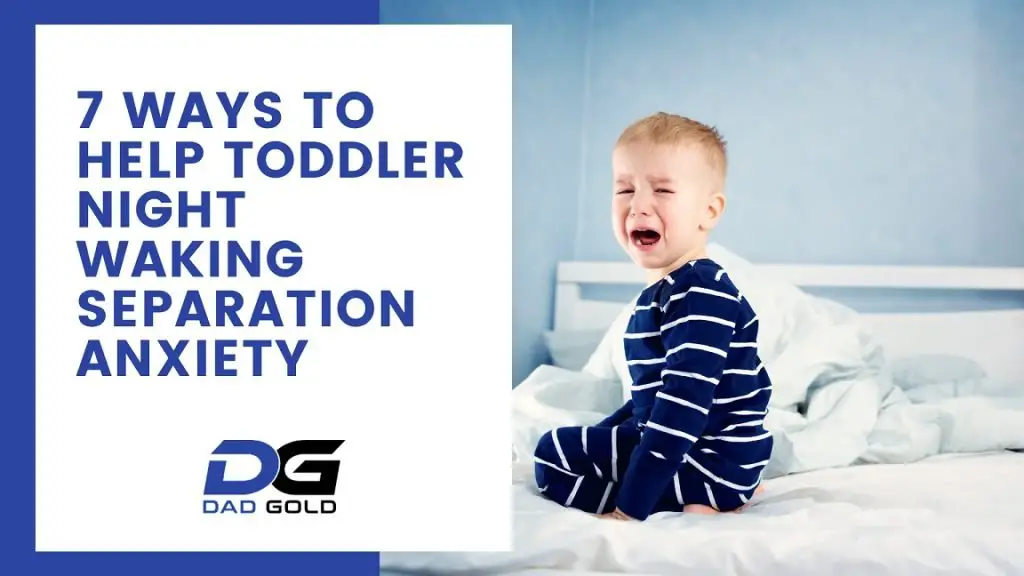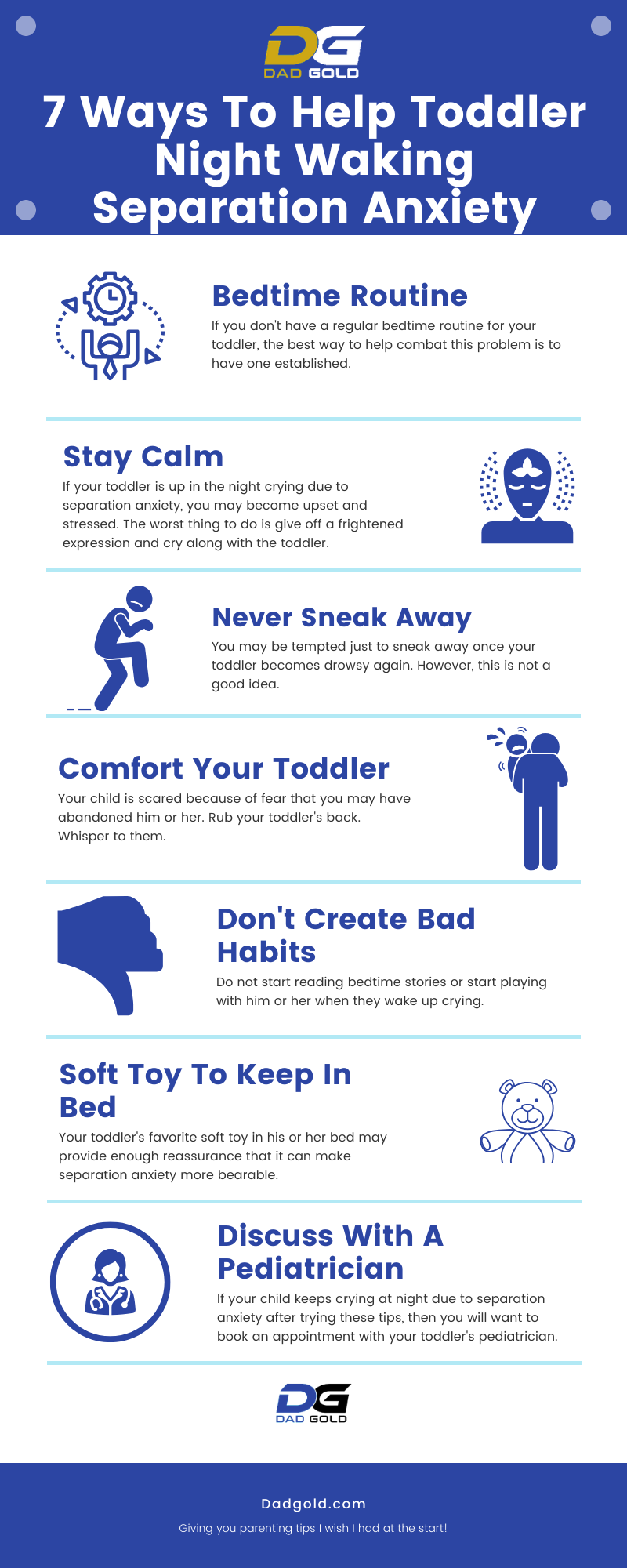Toddlers require anywhere from 11 to 14 hours of sleep per night. It would be excellent for parents if that meant they’d go right to sleep around 8 pm and then stay asleep until morning.
However, it does not work that way, unfortunately.
Your toddler typically sleeps well in the crib or bed. However, they are bound to begin a phase of waking up in the night. Even if it is just one time, perhaps your toddler may wake up two or three times a night, screaming!
This is part of the whole toddler night waking separation anxiety phase they go through.
The only way to get your toddler to stop screaming is by having to lull them back to sleep. And this begins to remind parents of how they were as newborns crying every few hours in the night for a feeding or a diaper change.
The longer this phase goes on, the more sleep-deprived the parents and the toddler will be, which is a toxic combination.
Parents also need to be reassured that this phase will be that, a phase and not last forever.
They also need to understand why their toddlers wake up in the night crying.

-

Bold Male Pride – Baseball Trucker Cap Celebrating Masculinity
£18.00 Select options This product has multiple variants. The options may be chosen on the product page -

Dad Bod Appreciation Gift Mug
£14.00 Add to cart -

Dad Bod, Bad Jokes Structured Baseball Cap
£22.00 Select options This product has multiple variants. The options may be chosen on the product page
Why Do Toddlers Wake Up In The Night Crying?
There could be several reasons your toddler is waking in the night screaming. First, let’s look at some of the possible reasons and discuss the culprit likely to cause this.
- Your toddler is sick or growing in molars – Do you remember when he or she was a teething infant? And more specifically, do you remember that as soon as your teething infant at the time had just begun sleeping through the night? And then regressed with that due to teething pain? That could potentially be a case of deja vu as your toddler may be unable to sleep due to the teething pain as the molars grow. Or, your toddler may be unwell. Sickness will get into the way of sleeping.
- Obstructive sleep apnea – If your toddler snores and is all of a sudden jolted awake from it, then that is obstructive sleep apnea. The cause for that is large adenoids or tonsils. If this keeps happening, then it is time to refer to a pediatric ENT by the pediatrician.
- Separation anxiety and fear – Toddler night waking is commonly due to separation anxiety. Separation anxiety in older babies and toddlers is normal and a good sign because they are at a point where they are forming bonds with their parents or caregivers. However, they still are at a developmental phase where they think their parents or caregivers are not anywhere near them if they are not in sight. That is what triggers the anxiety. They fear their parents or caregivers just disappeared. Then they cry and can throw tantrums as a result of the separation anxiety. They may also have fears caused by other types of stress if significant changes are happening, such as potty training, the arrival of a new sibling, a move, a new babysitter, and so on.
7 Ways To Help You Through The ‘Toddler Night Waking Separation Anxiety’ Phase
However, let’s focus on our toddler waking at night due to separation anxiety. And let’s now talk about the 7 ways to help with the situation so that your toddler and you can get the right amount of zzzzz’s!

1. Bedtime Routines Are Extremely Helpful
If you don’t have a regular bedtime routine for your toddler, the best way to help combat this problem is to have one established. Routines provide a sense of security for your toddler as they are predictable (which is exceptionally reassuring) and consistent.
Routines will help the toddler feel safe. An example of a routine is giving your toddler a soothing bath each night. After the bath, that is when it is time to go into the pajamas and for teeth brushing. And then it will be bedtime. Read a calm and fun bedtime story that will make it enjoyable for your toddler.
Another essential thing to keep in mind is not to allow your toddler to watch TV around two hours before bedtime. Instead, TV is too stimulating, and if they watch something scary, that increases the chances of having a nightmare or night terror.
Therefore, limiting TV time at night is another thing to add to the routine.
2. Stay Calm
If your toddler is up crying due to separation anxiety in the night, you may become upset and stressed. The worst thing to do is give off a frightened expression and cry with your toddler.
Many parents do that without even realizing it. It is startling and tiring when you are jolted awake due to your toddler screaming at 2 am. But it is important to remember that if you are visibly upset, that only sends the message to your toddler that bedtime is scary.
It is critical to stay calm, relax, and confident. That is what will help keep your toddler calm in the end.
3. Never Sneak Away
You may be tempted to sneak away once your toddler becomes drowsy again. However, this is not a good idea. You have come into your toddler’s room to calm them down, and then the next thing they know is that you’re not present after looking around again. That will only add to further uncertainty and fear.
Your toddler will believe that you will vanish if they look the other way. The best thing to do is tell your toddler goodbye lovingly as you walk out of the door while your toddler is looking at you.
4. It Is Important To Comfort Your Toddler
When your toddler’s wailing jolts you awake at 2 or 3 am, you may be exhausted and bleary-eyed. Therefore, all you may want to do is quickly go into their bedroom to show your toddler that you have not disappeared and then walk away afterward. You aren’t in the mood to be overly comforting, but you must comfort your child.
Your child is scared because of fear that you may have abandoned him or her. Rub your toddler’s back. Whisper to them. Your child needs the reassurance that you have not vanished.
It can happen quickly. You are not likely to need to spend the rest of the night comforting your toddler. Once your toddler is tired again, you can go back to bed.
However, as discussed in the point before, to leave in front of their eyes. It is also essential to quickly go to your toddler’s side because it shows that you are nearby.
5. Don’t Create Bad Habits
You know it is crucial to run over to your crying toddler in the night as quickly as possible. However, do not start reading bedtime stories or playing with them either. That will only create some bad habits, and you can imagine how much your toddler will love it.
Then the next thing you know, they will no longer cry in the night due to separation anxiety. Your child will wail at night because of wanting to play or listen to a story.
If that happens, you can say goodbye to having a peaceful sleep for a long time.
6. Make Sure That Your Toddler Has A Favorite Soft Toy To Keep In Bed
Putting toys and blankets into the crib is dangerous for an infant as any object in a crib is at risk for blocking the baby’s airways.
However, toddlers can bring soft toys and blankets into their cribs or beds. They can move around perfectly fine, whereas infants under four months of age can not.
Therefore, if you are worried about your toddler bringing their favorite soft toy to bed for that reason, there is no need to be. So unless your child has a disability, that can pose a risk.
Your toddler’s favorite soft toy in their bed may provide enough reassurance that it can make separation anxiety more bearable. However, that does not mean that they will not cry in the night for you.
However, after you comfort your child and are ready to go back to bed, remind them that the toy is there to make all fear go away. Your toddler will likely be able to calm down quickly and then go back to sleep.
7. Talk To Your Toddler’s Pediatrician
If your child keeps crying at night due to separation anxiety after trying these tips, you will want to book an appointment with your toddler’s pediatrician. If nothing is helping them ease the fear, then the child may have some anxiety disorder that will need treatment using specialized techniques.
And these techniques would be given by a pediatric psychologist.
However, these tips will help ease your toddler’s separation anxiety at night more often than not. And remember once again, the night waking due to this issue is a phase that will not last forever. Once your toddler understands that you are not in front of them, it does not mean that you vanished, then this issue should end.
Frequently Asked Questions

How long does separation anxiety last in toddlers?
Separation anxiety can last a few months. Usually, it is a phase that your toddler is going through. Your job is to remind your toddler that they are absolutely fine in bed alone.
Why does my 2-year-old wake up so much at night?
It could be for several different reasons. For example, your toddler might be scared (from a nightmare), or they could be in pain, or they could be going through the ‘toddler night waking separation anxiety’ phase.
Should I ignore my toddler crying at night?
I always check my son when he cries because I want to know if he is OK and not in pain. If your toddler is crying to get your attention, it is OK to let them cry for 5 minutes. I would not leave it longer than that.
Conclusion
If you are struggling with toddler night-waking separation anxiety, these 7 tips will help you through it!
These tips will help your toddler stop crying in the middle of the night. Some toddlers always wake up crying in the morning, which is very similar to this situation but can be caused by different things.
Good luck!


